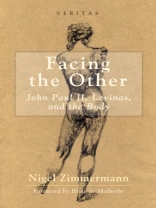What is the significance of the body? What might phenomenology contribute to a theological account of the body? And what is gained by prolonging the overlooked dialogue between St. John Paul II and Emmanuel Levinas? Nigel Zimmermann answers these questions through the agreements and the tensions between two of the most important thinkers of the twentieth century. John Paul II, the Polish pope, philosopher, and theologian, and Emmanuel Levinas, the French-Jewish philosopher of Lithuanian heritage, were provocative thinkers who courageously faced and challenged the assumptions of their age. Both held the human person in high regard and did their thinking with constant reference to God and to theological language. Zimmermann does not shirk from the challenges of each thinker and does not hide their differences. However, he shows how they bequeath a legacy regarding the body that we would overlook at significant ethical peril. We are called, Zimmermann argues, to face the other. In this moment God refuses a banal marginalization and our call to responsibility for the other person is issued in their disarming vulnerability. In the body, philosophy, theology, and ethics converge to call us to glory, even in the paradox of lowly suffering.
O autorze
Nigel Zimmermann is an Adjunct Lecturer with the Institute for Ethics & Society at the University of Notre Dame Australia and Senior Fellow with the PM Glynn Institute, Australian Catholic University (ACU). He co-edited Faith and Reason: Vistas and Horizonswith Sandra Lynch (Wipf & Stock, 2021), and is the editor of Streams of Light: Easter Messages from Australian Bishops during Lockdown 2020 (St Pauls, 2021) and The Great Grace: Receiving Vatican II Today (Bloomsbury, 2015). Nigel is author of Levinas and Theology (Bloomsbury, 2013) and Facing the Other: John Paul II, Levinas, and the Body(Cascade, 2015).







![Pokrywa Brian Schrag & Julisa Rowe: Community Arts for God's Purposes [Chinese] 貼近神心意的社群藝術 Pokrywa Brian Schrag & Julisa Rowe: Community Arts for God's Purposes [Chinese] 貼近神心意的社群藝術](https://static.worldofdigitals.com/thumb_webp/740/9781645083740.webp)




